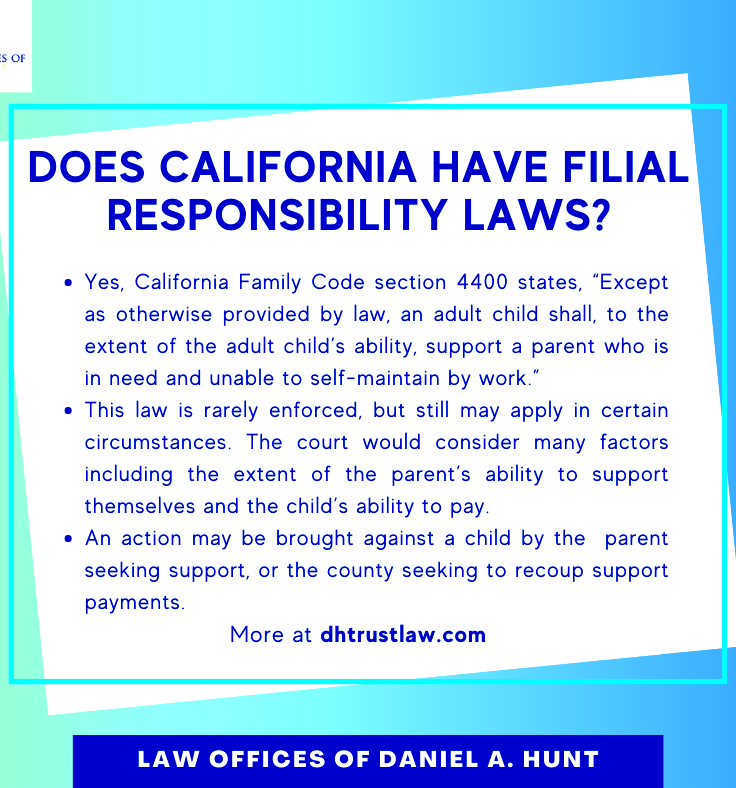Understanding California Filial Responsibility Law
The California Filial Responsibility Law is designed to ensure that adult children support their aging parents financially. This law recognizes the growing need for financial assistance for elderly individuals, particularly those who may not have sufficient retirement savings. Understanding this law is crucial for families to navigate their responsibilities and avoid potential legal issues.
History and Purpose of the Law

The Filial Responsibility Law in California dates back to the 19th century, originating from a concept rooted in English common law. Over the years, the focus on family obligations has shifted, reflecting societal changes and economic realities. The primary purpose of this law is to provide a safety net for elderly parents who may rely on their adult children for support, especially in times of financial hardship.
Some key points about the law’s history include:
- Early Origins: The law finds its roots in ancient practices where family members were expected to care for one another.
- Modern Adaptations: As family structures and societal norms evolved, California updated its laws to address contemporary issues faced by aging parents.
- Legislative Changes: The law has undergone revisions to reflect changing attitudes towards family obligations and economic support.
By establishing clear expectations, the law aims to prevent the financial burden from falling solely on state resources, promoting family responsibility and care.
Key Provisions of the Law

California’s Filial Responsibility Law outlines several important provisions that define the obligations of adult children. Understanding these provisions is essential for both parents and their children to avoid misunderstandings and legal conflicts.
Key provisions include:
- Financial Support: Adult children are legally required to provide necessary support to their elderly parents if they cannot afford it themselves.
- Scope of Support: The support can cover various expenses, including medical bills, housing costs, and daily living expenses.
- Legal Enforcement: If adult children fail to meet their obligations, parents or their caregivers can pursue legal action to seek financial support.
- Income Assessment: Courts may consider the income and financial situation of both the parents and the adult children when determining the level of support required.
Understanding these provisions helps families prepare for potential financial obligations and ensures that elderly parents receive the necessary care and support they deserve.
Who is Affected by Filial Responsibility?
The California Filial Responsibility Law affects various parties within a family unit. While it primarily targets adult children, the implications extend to elderly parents and even state resources. Understanding who is affected can help clarify responsibilities and expectations.
Here’s a breakdown of the key parties involved:
- Adult Children: The law holds adult children accountable for providing financial support to their aging parents. This obligation applies regardless of whether they live nearby or far away.
- Elderly Parents: Parents who require assistance due to age or health-related issues are directly affected. They have the right to seek support from their children if they cannot meet their financial needs.
- Caregivers: Individuals or organizations providing care for elderly parents may also be impacted. If they are unable to cover costs, they can pursue support from the parents’ children.
- State Resources: When adult children do not fulfill their responsibilities, the state may end up covering the costs. This can lead to increased strain on public resources, prompting lawmakers to enforce filial responsibility more strictly.
Understanding the broader impact of this law is vital for families to ensure they are prepared and know their responsibilities.
Legal Implications for Adult Children
Adult children need to understand the legal implications of the California Filial Responsibility Law, as failing to meet their obligations can lead to significant consequences. This law is not just a guideline; it carries real legal weight.
Some key legal implications include:
- Financial Liability: If adult children do not provide the necessary support, they may face lawsuits from their parents or caregivers seeking reimbursement for expenses incurred.
- Court Orders: In severe cases, a court may issue an order mandating adult children to provide financial support, which can include wage garnishments.
- Impact on Credit: Legal actions or unpaid support obligations can negatively affect an adult child’s credit score, impacting their financial future.
- Criminal Charges: While rare, willful neglect of a parent’s needs can sometimes lead to criminal charges, depending on the circumstances and the extent of neglect.
Being aware of these implications helps adult children understand their responsibilities and the potential consequences of neglecting them.
Exceptions and Limitations of the Law
While the California Filial Responsibility Law establishes clear obligations for adult children, there are exceptions and limitations to consider. Not every situation falls under the law’s jurisdiction, which can provide relief in certain cases.
Some important exceptions include:
- Financial Hardship: If an adult child can demonstrate significant financial hardship, they may be excused from providing support. This can include circumstances like job loss or excessive debt.
- Estrangement: If an adult child has been estranged from their parent for a substantial period, they may not be held responsible for support. Courts typically consider the nature of the relationship.
- Dependent Adults: If an adult child is themselves financially dependent or caring for another dependent, this may limit their obligation to support their parents.
- Health Issues: An adult child facing serious health issues may be excused from providing support, especially if their condition impacts their ability to work.
It’s important for families to understand these exceptions, as they can provide necessary relief and clarity in challenging situations.
Enforcement of Filial Responsibility in California
Enforcement of the California Filial Responsibility Law is an important aspect that ensures families uphold their financial obligations to aging parents. While the law establishes clear responsibilities, how it is enforced can vary based on individual circumstances.
Here are some key points regarding enforcement:
- Legal Action: If adult children fail to provide necessary support, parents or their caregivers can take legal action. This often involves filing a lawsuit to seek financial assistance.
- Court Proceedings: Once a lawsuit is filed, the case may go to court. Here, the judge will assess the situation and determine whether the adult child is liable for support.
- Income Verification: During court proceedings, both parties may need to disclose their financial information. This includes income statements, tax returns, and other relevant documents to help determine the adult child’s ability to pay.
- Possible Outcomes: If the court rules in favor of the parent, the adult child may be ordered to provide financial support, which could lead to wage garnishments or other enforcement actions.
Understanding the enforcement mechanisms helps families know what to expect if disputes arise, reinforcing the importance of fulfilling their responsibilities.
Common Questions about California Filial Responsibility Law
Many families have questions about the California Filial Responsibility Law, especially regarding its implications and how it works. Here are some common questions and their answers:
- Who is legally responsible for supporting elderly parents? Adult children are typically responsible for providing financial support if their parents cannot afford their living expenses.
- Can siblings share the financial burden? Yes, siblings can work together to meet their obligations. The law does not specify that only one child is responsible.
- What if my parent refuses help? If a parent refuses support, the adult child may not be held liable, but the situation can become complicated if legal action is pursued.
- How can I prepare for potential obligations? Keeping open lines of communication with family members about financial situations can help prepare for any potential responsibilities.
Understanding these common questions can help families navigate their obligations more effectively and reduce misunderstandings.
Conclusion and Final Thoughts
The California Filial Responsibility Law is an important piece of legislation that underscores the responsibility adult children have towards their aging parents. By understanding the law’s provisions, enforcement mechanisms, and exceptions, families can better prepare for their obligations.
In conclusion, here are a few key takeaways:
- Know Your Responsibilities: Familiarize yourself with the law to ensure you meet your obligations to support aging parents.
- Open Communication: Maintain clear communication within your family about financial matters and expectations.
- Seek Legal Advice: If you’re unsure about your rights or responsibilities, consulting a legal professional can provide clarity and guidance.
By being informed and proactive, families can navigate the complexities of filial responsibility and ensure that their loved ones receive the support they need.


